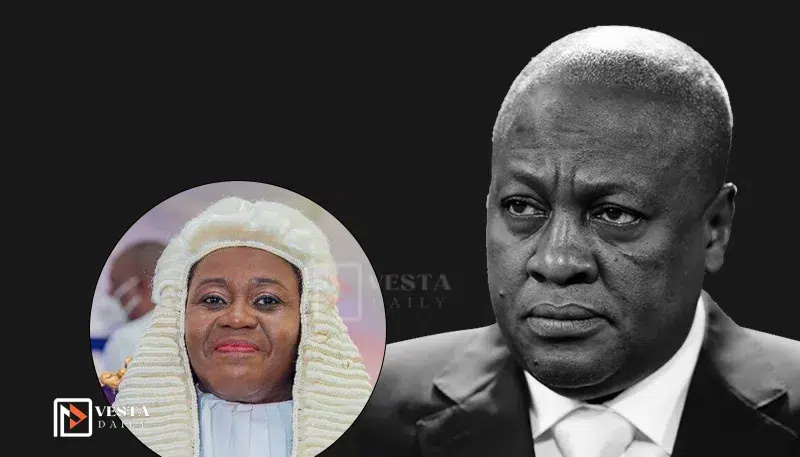Breaking: President Mahama Suspends Chief Justice Torkornoo Amid Constitutional Probe
Presidential Action Following Multiple Petitions
In a significant development that has sent shockwaves through Ghana’s judicial system, President John Dramani Mahama has officially suspended Chief Justice Gertrude Araba Esaaba Torkornoo from office. This decisive action follows the receipt of three separate petitions calling for her removal, triggering a constitutional process that could reshape the nation’s judiciary.
The suspension was executed under Article 146(10) of the 1992 Constitution, which empowers the president to take such action after proper consultation with the Council of State.
The Investigation Committee: Who’s Involved
Five-Member Probe Panel Formation
A high-powered five-member committee has been established to thoroughly investigate the allegations contained in the petitions. The committee’s composition reflects a deliberate balance of judicial experience and professional diversity:
- Chairperson: Justice Gabriel Scott Pwamang, Justice of the Supreme Court
- Member: Justice Samuel Kwame Adibu-Asiedu, Justice of the Supreme Court
- Member: Daniel Yaw Domelevo, former Auditor-General of Ghana
- Member: Major Flora Bazwaanura Dalugo of the Ghana Armed Forces
- Member: Professor James Sefah Dzisah, Associate Professor at the University of Ghana
This diverse committee brings together expertise from the judiciary, financial oversight, military discipline, and academia, ensuring a comprehensive examination of the petitions.
Constitutional Process in Motion
The President’s decision aligns with his constitutional obligations under Article 146(6), which requires him to act on judicial petitions upon receiving recommendations from the Council of State.
According to legal experts at the Ghana Bar Association, this process represents one of the most serious constitutional procedures available for ensuring judicial accountability.
Chief Justice’s Response
Chief Justice Torkornoo has not remained passive during these proceedings. Following the formal constitutional protocol, she:
- Requested copies of all petition documents
- She was granted a 10-day window to prepare her preliminary response
- Submitted her official response on April 7
Despite her prompt compliance with procedural requirements, the Council of State’s review determined that a prima facie case existed, necessitating her suspension while investigations proceed.
Implications for Ghana’s Judiciary
This unprecedented development raises important questions about judicial independence and accountability in Ghana’s democratic system. According to governance monitors at the Ghana Center for Democratic Development, the suspension of a sitting Chief Justice represents an extraordinary measure that legal practitioners, civil society organizations, and international observers will closely watch.
The Chief Justice will remain suspended throughout the committee’s proceedings, with the potential outcomes ranging from full reinstatement to permanent removal from office.
What Happens Next?
The five-member committee will now begin its formal investigation into the allegations contained in the petitions. Their findings will determine whether:
- The allegations merit further action
- The Chief Justice should be permanently removed
- The petitions should be dismissed, and the Chief Justice reinstated
Timeline for Resolution
While no official timeline has been announced, similar constitutional investigations typically follow strict procedural guidelines to ensure fairness and thoroughness.



